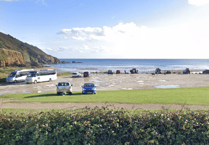There is a growing groundswell of opinion in Cornwall against paying the toll to cross the Tamar Bridge, which is having a “massive impact” on the economy of south east Cornwall. A councillor from the area asked Cornwall Council’s Cabinet to take a closer look at the issue today (Wednesday, May 10).
The Tamar Bridge is now the most expensive toll bridge in the country, despite being significantly smaller than other crossings, such as the Dartford M25 crossing, the Mersey Tunnel and the Humber Bridge. It currently costs £2.60 to cross from Cornwall into Devon for a car, increasing to £14.30 depending on the size of vehicle, with half-price reductions if you have a Tamar Tag.
The Tamar Toll Action Group, which was formed a year ago, has almost 3,000 members and is calling for the complete abolition of the tolls to cross the Tamar – including the Torpoint ferries. It says the cost of crossing regularly is having a huge financial impact on businesses and residents, particularly those who live in the south east Cornwall area. The group cites a Saltash business paying £7,000 a month in crossings as as an example of the economic impact the tolls are having locally.
The Tamar Bridge is linked to the Torpoint Ferries via the Tamar Bridge Act. Both crossings are jointly owned by Cornwall Council and Plymouth City Council, and operated by the Tamar Bridge and Torpoint Ferry Joint Committee (TBTFJC).
Armand Toms, who represents Looe East & Deviock, told Conservative cabinet members at a meeting in Truro today: “The Tamar Bridge is an issue I’d like you to all look at because it’s having a massive impact. There is a groundswell that’s against the cost of the tolls.”
Connor Donnithorne, portfolio holder for transport, replied that it was for the joint committee of the Tamar Bridge and Torpoint Ferries to make recommendations on the toll process and to negotiate with the Government. At the most recent joint committee meeting, members agreed to write to MPs in both Cornwall and Plymouth to organise a meeting to try and secure a long-term position for the crossings that is “viable and sustainable”.
Cllr Donnithorne added: “We have to be bound by the statute and the Tamar Bridge Act requires it to be user-paid. Until we have movement from the Department for Transport, we can only operate within the parameters of the legislation, and that is difficult … I’ve never disputed that. It will require difficult conversations and, hopefully, we will secure a position that the Department for Transport recognises that it’s a key economic driver for south east Cornwall, but wider than that – the rest of Cornwall and going into south Devon as well.”
The Tamar Toll Action Group stresses there is no practical alternative to entering Cornwall from the Plymouth area, or vice versa. “It is wrong that its upkeep and maintenance is funded by local councils via a toll which results in an unfair financial burden on local people and businesses.”
Of the TBTFJC, the group states: “Whilst this coalition was instrumental in the construction of the bridge more than 60 years ago, the aim understood by the people then was for the bridge to be centrally funded once its costs had been covered by toll payments (as has happened with the more recently built Severn Bridge). Unfortunately, this aim appears to have been lost with the passing of time and record of existence of that aim is challenging to locate.”
Scott Slavin, vice-chair of the group, said: “Our ultimate goal is to have tolls scrapped entirely. We want the Government to take on funding of this crossing; both crossings – the ferry and the bridge. They are absolutely vital to the wellbeing of communities on both sides of the River Lynher in south east Cornwall. If you have to access Derriford Hospital it involves a toll – we have no other hospital services we can use which provide the same facility. So crossing to get to the hospital costs money, crossing to go shopping costs money, crossing to take your children to school costs money, crossing for work costs money.”
Mr Slavin, who lives in Saltash, doesn’t need to cross the bridge for work but for leisure purposes alone it costs him and his family £500 to £600 a year at the reduced Tamar Tag rate. Anybody crossing without a tag at the same sort of frequency would obviously have to pay double that amount.
“People crossing for work, with multiple crossings a day – and we have members in our group who have to do that – their costs are substantially higher,” he added.
A recycling company based in Saltash showed Mr Slavin a copy of their tag statements recently, which included £7,000 for one month alone. He said: “The additional rub for them is that everyone who uses the bridge subsidises the ferry because the ferry runs at a loss – it does seem a little unfair that a company which pays so much per month to cross the bridge actually can’t use the ferry at all because their vehicle is too big for it. The Government needs to look at the whole system again.”
The group formed in April 2022 to share its anger “at the way the public consultation had been conducted for increasing the toll and the fact they introduced the discount rate toll for tag holders effectively immediately while having to go out to consultation to increase the cash rate,” added Mr Slavin. “The people who cross the bridge by tag got about two weeks notice that their toll was going up by 30 per cent. The public notice for the public consultation and to make representations to the Secretary of State for Transport was done in a rather underhand way, very discretely published. We felt that wasn’t enough effort to make people aware of what was happening.”
The action group has written to every councillor at every parish and town council in Cornwall and has received support from Cornwall councillors, predominantly those representing divisions in south east Cornwall, including Armand Toms, Colin Martin and Hillary Frank as well as engaging with MPs including Sheryll Murray and Luke Pollard.





Comments
This article has no comments yet. Be the first to leave a comment.